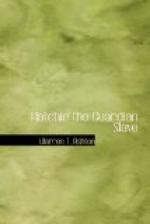After Maxwell had recovered from the blow which had felled him to the deck, and while Henry was soothing the distress of Emily, he met Vernon, who was in the act of reconnoitring the young officer’s state-room. Vernon was just the person to serve him in this extremity. The protector of Emily must be removed from his charge, as her uncle had been by De Guy. He resolved upon a consultation with the blackleg. Accordingly he expressed his desire, to which the gambler replied by requesting him to give notice of the approach of any one, while he did a little business in the state-room.
Maxwell vainly remonstrated, but was obliged to comply with the wishes of the robber, or lose his services.
Vernon, thus protected from intrusion, entered the room, and by the aid of a pick-lock soon succeeded in obtaining possession of all poor Henry’s earthly wealth. Beckoning Maxwell to follow, he descended to the main deck, where, procuring a lantern, they proceeded aft.
We must return to Uncle Nathan and Pat Fegan, whom we left on their way to the fugitive in the hold of the steamer.
“Whisht, now,” said Pat, in a whisper, as they prepared to jump down the hatchway; “whisht, now, and don’t spake a loud word, for the life of yous.”
Uncle Nathan promised obedience, and followed Pat into the hold. All was total darkness, and it was not without a feeling of superstitious dread that Uncle Nathan heard his companion tap on the box which contained the mulatto. He heard the whispered recognition of its inmate, and stood like a statue while Hatchie freed himself from his confinement.
“Whisht, now,” said Pat, in a low voice; “give me your hand, Mr. Binson. Now, there yous are,” and he placed Uncle Nathan’s hand in that of Hatchie.
Uncle Nathan found the hand was warm, and felt completely relieved of the sensation of fear which had come over him.
“Glad to see you,” said he, though an instant afterwards his conscience asked him if he had not told a lie, inasmuch as it was so dark he could not see anything.
“You are a friend, I trust,” replied Hatchie, who, although he implicitly relied on the faith of the Irish ally, had not the fullest confidence in his judgment. Nothing but what he deemed a stern necessity would have compelled him to trust the secret with any one. So many dangers encompassed him, that the duty he owed to his injured mistress obliged him to look around for the means of preserving the valuable document he possessed. An accident to the steamer, the continuous danger of being restored to Jaspar, and a hundred other painful reflections, brought him to the resolution of depositing the will in the hands of the most trustworthy person he could find. In this extremity, he canvassed the characters of all he knew on board. Henry Carroll, he feared, was too impetuous, if not actually devoted to Jaspar. He knew nothing of the interesting




